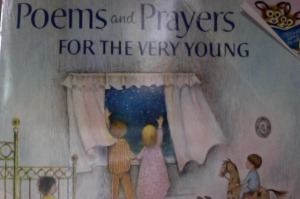God, we thank you for this food,
For rest and home and all things good;
For wind and rain and sun above,
But most of all for those we love.
Maryleona Frost
From Poems and Prayers for the Very Young (Martha Alexander, illustrator, Random House, New York, 1973)
My friend Cheri tucked this little paperback into a box of baby presents when my younger son was born. She had one for her two girls and thought I’d like one, too. These four lines are just one of the treasures in it.
This little table blessing doesn’t put conditions on thanks. There is no escape clause if peas are served rather than corn on the cob. Home can be an apartment or a mansion, and rest had in a tent or on a sofa. Wind and sun and rain reign above for rich and poor, friend and stranger. Thanks are included for those we love with no distinction.
When we leave childhood behind, we make distinctions. We separate the foods we like and the ones we don’t, saving our approval and our thanks for what we want. Our homes become places moving toward an imagined ideal, not a place where we can live interesting lives. The elements are welcome when they don’t interfere with the daily commute or vacation plans. Even love can be doled out according to merit and convenience.
I’m old enough now to leave that kind of adulthood behind for a second kind of childhood – not simplistic, but simple. I am thankful for whatever is on my plate. I am grateful for the means to eat when many will not. When I welcome friends and family with kindness, care, and attention, my home is good enough. I trust they come to visit me and my family, not my furniture. And for those I love? Imperfect just like I am, and God’s sure grace in my life.
For all these, God, may I always be thankful.

